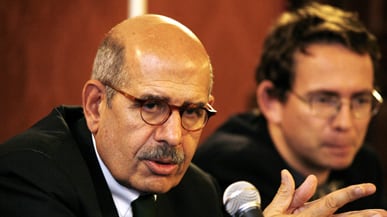Mohamed ElBaradei wants to bring down the corrupt Mubarak regime. He talks to Reza Aslan about his call for an election boycott, the prospect of violence, and his disappointment with Obama.
Mohamed ElBaradei, the 68-year-old Egyptian diplomat and former head of the International Atomic Energy Agency, may not look like a modern-day Moses, but he has made it his ambition in the final years of his life to bring down a modern day Pharaoh—Egypt’s “president-for-life,” Hosni Mubarak.
After decades of public service in New York and Vienna, including a stint as head of the International Atomic Energy Agency (for which he received the Nobel Peace Prize in 2005), ElBaradei has returned to his home country to take on one of the most oppressive regimes in the Arab world, a country that has instituted a permanent application of emergency laws, which allow the government to arrest anyone at any time for any reason and for however long it chooses.
Did I mention that Egypt is also one of America’s closest allies? The country hauls in nearly $2 billion a year of American taxpayer money (the second-largest aid amount after the $3 billion a year we send to Israel), the vast majority of which is used to purchase the military equipment necessary to maintain its repressive police state.
Now, as we approach what will likely be another seemingly pointless election in Egypt, significant solely for the fact that it will probably be Mubarak’s last (he is 82 years old and reportedly in poor health), ElBaradei has injected a sense of excitement into the country’s sclerotic political scene by hinting that he may challenge Mubarak for the presidency. ElBaradei has received a wave of support, especially from Egypt’s youth, many of whom had until now shunned politics as a useless enterprise.
In an exclusive interview with The Daily Beast, ElBaradei remained coy about his intention to challenge Mubarak in the next presidential elections. “I might run if there is the prospect for a free and fair election, but I will definitely not run if it’s under the present circumstances, when you don’t have any guarantees to a free and fair election, when you have a situation completely slanted in favor of the ruling party and you don’t have judicial supervision.”

Of course, ElBaradei grudgingly admits that there is absolutely no chance the Egyptian government will meet any of his demands. Nevertheless, he has been steadily building support in Egypt, managing to collect an impressive one million signatures for a petition demanding constitutional changes that would allow for a freer, more democratic country. Until that happens, ElBaradei is calling for a wholesale boycott of the upcoming parliamentary elections slated for next month. “I think if people are united in boycotting the election it would be in my view the end of the regime domestically and internationally,” he told me by phone. “In my view it is the easiest, fastest, the most direct way to delegitimize the regime.”
“I think if people are united in boycotting the election it would be in my view the end of the regime domestically and internationally,” ElBaradei told me.
Most of the country’s opposition parties, including the Communists, are backing ElBaradei’s calls for a boycott. But if the boycott plan is to work it must gain the support of Egypt’s largest and most dynamic political party: the Muslim Brotherhood.
So far, the Muslim Brotherhood has split over whether to join the boycott. Some in the movement want to take advantage of the minimal gains they achieved in 2005 when they were allowed, for the first time ever, to take part in parliamentary elections, albeit as independent candidates (the organization remains illegal in Egypt). Others, citing the increased repression that they suffered after their electoral success, think they can pressure Mubarak by joining ElBaradei’s boycott.
It is precisely his international status that has allowed ElBaradei to appeal both to secular groups like Ghad and to religious groups like the Brotherhood, forming a powerful coalition whose popularity and influence seems to have caught the Mubarak regime by surprise. The president’s allies have belatedly attempted to smear ElBaradei’s campaign, posting articles in government run newspapers calling him an atheist and claiming his daughter has married a non-Muslim. It has been reported that Mubarak himself has been involved in the attacks against ElBaradei, seeing the former diplomat as a threat to his plans to ultimately transfer presidential power to his son Gamal.
Yet ElBaradei is undaunted by the attacks in the government media. “Yes, of course my credibility allows me much freedom to speak up,” he says. “On the other hand, I feel like I owe it to my fellow Egyptians to speak on their behalf.”
He has taken full of advantage of this freedom to go after Mubarak directly, calling him “a decaying, nearly collapsing temple” and openly predicting a change in regime in the near future. “These are the means available for peaceful change: Boycotting the election, demonstration, petition and civil disobedience,” he says. “Whether the government will respond and understand that they have to change or not, that is an open question. But if they don’t, they will do that at their own risk because we still believe we will see [change] happening through peaceful means, but if things continue the way they are, I don’t exclude that people will resort to violence which is the last thing I would like to see.”
When I tell him that this could easily be construed as a threat, he brushes off the criticism. “I want to preempt violence,” he says. But, he adds, if there were violence, it would not be because of his calls for democracy. Rather it would be “a revolt of the poor.”
“When you have half of Caironese in slums, when you don’t have clean water, when you don’t have a sewer system, when you don’t have electricity, and on top of that you live under one of the most repressive regimes right now…Well, put all that together and it’s a ticking bomb. It’s not of a question of threat. It is question of looking around at the present environment and making a rational prognosis.”
ElBaradei cannot hide his disappointment with the way that President Obama has seemingly turned his back on democratization efforts in the Arab world. Not that he was a fan of President Bush’s ham-fisted attempts at democracy promotion. On the contrary, ElBaradei was a frequent critic of the Bush administration, which is why he is still loathed in certain political circles in the U.S. But he does admit that the pressure applied by Bush on Mubarak did force a brief flowering of democracy in Egypt in 2005, the year in which Ayman Nour, Egypt’s most famous (and most frequently jailed) democracy activist, and the Muslims Brotherhood both were allowed to contest the elections.
Obama, who has been silent about the prospect of an ElBaradei candidacy, seems to have abandoned the idea of democracy promotion altogether—whether in Egypt or anywhere else in the Middle East. When he made his much-lauded speech in Cairo last year, he mentioned the word “democracy” only once—and it received by far the loudest and most sustained applause of the entire speech.
I ask ElBaradei whether he would like to see Obama apply more pressure on Mubarak to allow for greater freedoms in Egypt. “Well, it is up to Barack Obama,” he says. “It’s up to any government to decide how to react to the denial of basic human rights anywhere in the world including Egypt. All I can say is this—those who believe that stability comes with repression are really shortsighted and should not be surprise if the Middle East continues to move toward radicalization. In my view, stability only comes with a government that is elected by the people and works for the people.”
In ElBaradei’s view, if Egyptians are allowed the right to choose their own government, to have say in their own political affairs, then it would provide precisely the stability and security that the U.S. government is so desperate to achieve in the Middle East.
“The sooner we put Egypt on the right track the sooner we would be able to have an Egypt that is modern, that is moderate and that is acting as a beacon for freedom and liberty across the Arab world.”
As Egyptians like to say, Inshallah. God willing.
Reza Aslan is author of the international bestseller No god but God and Beyond Fundamentalism. His new book Tablet and Pen: Literary Landscapes from the Modern Middle East comes out in Nov. Follow him on Twitter and Facebook.






